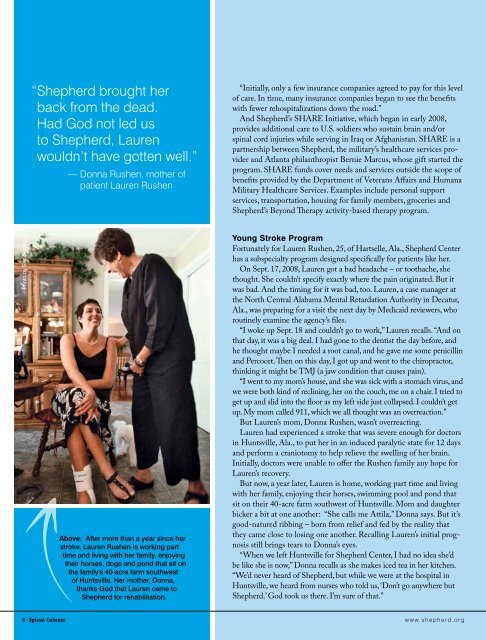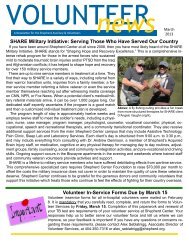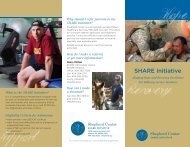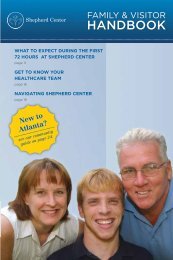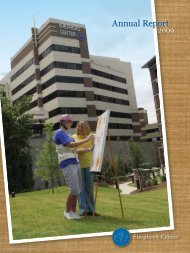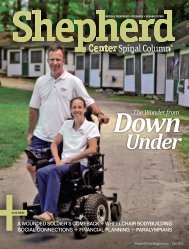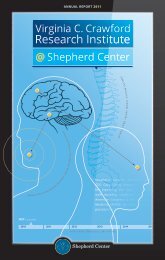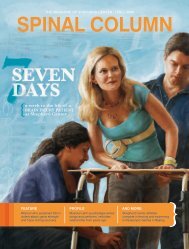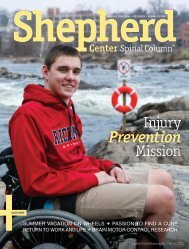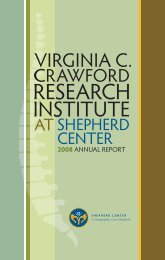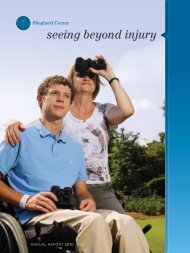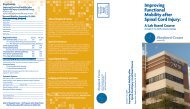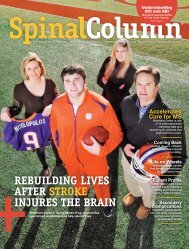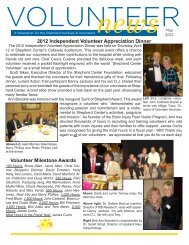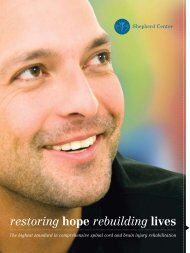the BRAIN - Shepherd Center
the BRAIN - Shepherd Center
the BRAIN - Shepherd Center
Create successful ePaper yourself
Turn your PDF publications into a flip-book with our unique Google optimized e-Paper software.
“<strong>Shepherd</strong> brought her<br />
back from <strong>the</strong> dead.<br />
Had God not led us<br />
to <strong>Shepherd</strong>, Lauren<br />
wouldn’t have gotten well.”<br />
—Donna Rushen, mo<strong>the</strong>r of<br />
patient Lauren Rushen<br />
“Initially, only a few insurance companies agreed to pay for this level<br />
of care. In time, many insurance companies began to see <strong>the</strong> benefits<br />
with fewer rehospitalizations down <strong>the</strong> road.”<br />
And <strong>Shepherd</strong>’s SHARE Initiative, which began in early 2008,<br />
provides additional care to U.S. soldiers who sustain brain and/or<br />
spinal cord injuries while serving in Iraq or Afghanistan. SHARE is a<br />
partnership between <strong>Shepherd</strong>, <strong>the</strong> military’s healthcare services provider<br />
and Atlanta philanthropist Bernie Marcus, whose gift started <strong>the</strong><br />
program. SHARE funds cover needs and services outside <strong>the</strong> scope of<br />
benefits provided by <strong>the</strong> Department of Veterans Affairs and Humana<br />
Military Healthcare Services. Examples include personal support<br />
services, transportation, housing for family members, groceries and<br />
<strong>Shepherd</strong>’s Beyond Therapy activity-based <strong>the</strong>rapy program.<br />
Photo by Eric Schultz<br />
Above: After more than a year since her<br />
stroke, Lauren Rushen is working part<br />
time and living with her family, enjoying<br />
<strong>the</strong>ir horses, dogs and pond that sit on<br />
<strong>the</strong> family's 40-acre farm southwest<br />
of Huntsville. Her mo<strong>the</strong>r, Donna,<br />
thanks God that Lauren came to<br />
<strong>Shepherd</strong> for rehabilitation.<br />
Young Stroke Program<br />
Fortunately for Lauren Rushen, 25, of Hartselle, Ala., <strong>Shepherd</strong> <strong>Center</strong><br />
has a subspecialty program designed specifically for patients like her.<br />
On Sept. 17, 2008, Lauren got a bad headache – or toothache, she<br />
thought. She couldn’t specify exactly where <strong>the</strong> pain originated. But it<br />
was bad. And <strong>the</strong> timing for it was bad, too. Lauren, a case manager at<br />
<strong>the</strong> North Central Alabama Mental Retardation Authority in Decatur,<br />
Ala., was preparing for a visit <strong>the</strong> next day by Medicaid reviewers, who<br />
routinely examine <strong>the</strong> agency’s files.<br />
“I woke up Sept. 18 and couldn’t go to work,” Lauren recalls. “And on<br />
that day, it was a big deal. I had gone to <strong>the</strong> dentist <strong>the</strong> day before, and<br />
he thought maybe I needed a root canal, and he gave me some penicillin<br />
and Percocet. Then on this day, I got up and went to <strong>the</strong> chiropractor,<br />
thinking it might be TMJ (a jaw condition that causes pain).<br />
“I went to my mom’s house, and she was sick with a stomach virus, and<br />
we were both kind of reclining, her on <strong>the</strong> couch, me on a chair. I tried to<br />
get up and slid into <strong>the</strong> floor as my left side just collapsed. I couldn’t get<br />
up. My mom called 911, which we all thought was an overreaction.”<br />
But Lauren’s mom, Donna Rushen, wasn’t overreacting.<br />
Lauren had experienced a stroke that was severe enough for doctors<br />
in Huntsville, Ala., to put her in an induced paralytic state for 12 days<br />
and perform a craniotomy to help relieve <strong>the</strong> swelling of her brain.<br />
Initially, doctors were unable to offer <strong>the</strong> Rushen family any hope for<br />
Lauren’s recovery.<br />
But now, a year later, Lauren is home, working part time and living<br />
with her family, enjoying <strong>the</strong>ir horses, swimming pool and pond that<br />
sit on <strong>the</strong>ir 40-acre farm southwest of Huntsville. Mom and daughter<br />
bicker a bit at one ano<strong>the</strong>r: “She calls me Attila,” Donna says. But it’s<br />
good-natured ribbing – born from relief and fed by <strong>the</strong> reality that<br />
<strong>the</strong>y came close to losing one ano<strong>the</strong>r. Recalling Lauren’s initial prognosis<br />
still brings tears to Donna’s eyes.<br />
“When we left Huntsville for <strong>Shepherd</strong> <strong>Center</strong>, I had no idea she’d<br />
be like she is now,” Donna recalls as she makes iced tea in her kitchen.<br />
“We’d never heard of <strong>Shepherd</strong>, but while we were at <strong>the</strong> hospital in<br />
Huntsville, we heard from nurses who told us, ‘Don’t go anywhere but<br />
<strong>Shepherd</strong>.’ God took us <strong>the</strong>re. I’m sure of that.”<br />
6 Spinal Column w w w. s h e p h e r d . o r g


